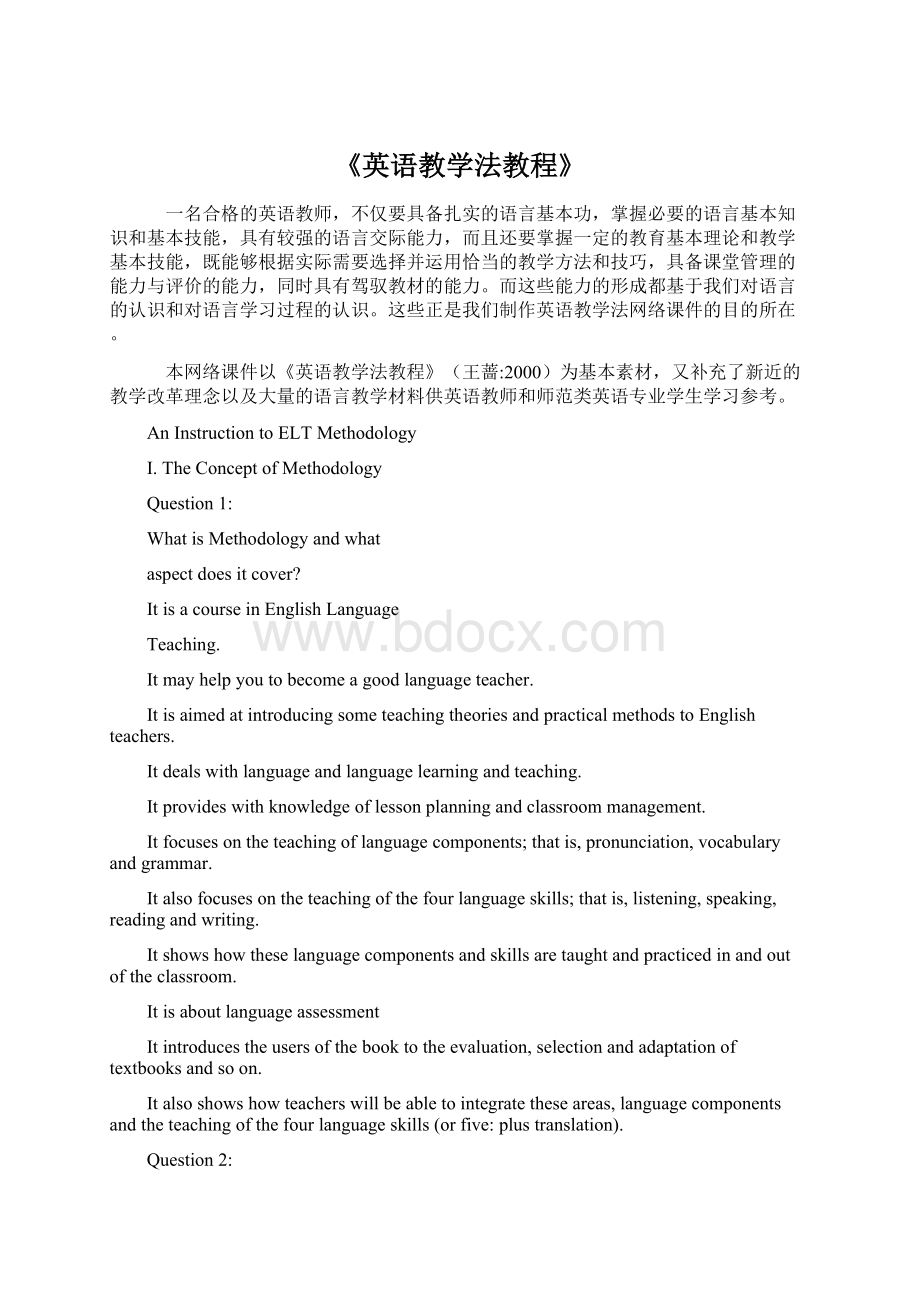《英语教学法教程》Word文档格式.docx
《《英语教学法教程》Word文档格式.docx》由会员分享,可在线阅读,更多相关《《英语教学法教程》Word文档格式.docx(55页珍藏版)》请在冰豆网上搜索。

Itfocusesontheteachingoflanguagecomponents;
thatis,pronunciation,vocabularyandgrammar.
Italsofocusesontheteachingofthefourlanguageskills;
thatis,listening,speaking,readingandwriting.
Itshowshowtheselanguagecomponentsandskillsaretaughtandpracticedinandoutoftheclassroom.
Itisaboutlanguageassessment
Itintroducestheusersofthebooktotheevaluation,selectionandadaptationoftextbooksandsoon.
Italsoshowshowteacherswillbeabletointegratetheseareas,languagecomponentsandtheteachingofthefourlanguageskills(orfive:
plustranslation).
Question2:
Whyareourchildren/peoplelearningEnglish?
Theyhavetopasstheexaminations.
Theycanhelpforeignvisitors.
It’snecessaryiftheywanttoenteruniversity.
Learningaforeignlanguageisanintellectualchallenge.
Theycanusecomputersmoreeasily.
Theyneedtokeepintouchwithwhatisgoingonintheirprofessionworldwide.
Englishwillbeveryimportanttogetajobintrade.
Englishwillbeusefulforthemtotravelabroad.
TheywillbeabletoreadandlistentoinEnglish.Thiscanimprovetheirknowledgeoftheworld.
Ofcourse,therearenorightorwronganswers.ButwhattheyaredoingintheEnglishclassisgainingskillsthatmighthelptheminlife.
Question3:
Howdo/didyoustudyEnglish?
Differentstudentsstudyindifferentways.
AllroadsleadtoRome/English.
Question4:
HowwasEnglishtaughtinthepast?
Thefollowingquestionsmayhelpyoutoanswertheformerquestion.
Whathappenedatthebeginningofeachlesson?
Howdidyouhavetoprepareforthelesson?
Howdidyoufeelduringyourlesson?
Whatstepdidtheteacherfollow?
Whatdidyou&
theteacherdoinclass?
Howmuchhomeworkdidyouhave?
Whatdidyouenjoymostaboutyourclasses?
Hereissomethingthatyoushouldalwayskeepinmindasateacher:
Yourrelationshipwithyourstudentsandwiththesubjectyouareteachingwillalwayshaveanimportanteffectonthestudentslearning.
Question5
Whatislanguage?
Languageisameansofcommunicationwithotherpeople.
Question6:
Sowhatistheaimorpurposeoflanguageteaching?
Communication.
Question7:
Howmanylanguageteachingmethodsorapproachesdoyouknow?
thegrammar-translationmethod
thedirectmethod
theaudio-lingualmethod
thesituationallanguageteaching
thecognitiveapproach
thesilentway
thetotalphysicalresponsemethod
thecommunicativeapproach
thenaturalapproach
thefunctional-notionalmethod,etc.
II.CurrentTeachingMethodsandApproaches
IncurrentlanguageclassesinChina,itisverypopulartoapplythefollowingteachingmethods,whicharemorepopularandpractical:
1.Theobjectiveteachingmethod
It’s3keyelements:
TeachingObjectives,objectiveactivitiesandteachingevaluation.
2.Five-stepTeachingMethod
(1)Revision
(2)Presentation(3)Drill(4)Practice(5)Consolidation
Eachclasscontainsatleast3parts:
●
Reviewlearnedlanguagematerials
Teachnewlanguagecomponents:
phonetics,vocabularyand
grammar.
Carryoutvariousformsof4skills’activities.
3.TheIntegralTeachingMethod
Itisquitesimilartothecommunicativeapproach,whichwillbediscussedindetailandfullyinUnit2.
Question8:
Whatisagoodlanguageteacher?
AgoodEnglishteachershouldhave(strong)ethicdevotion,(certaindesirable)personalstyleand(necessary)professionalqualities.
E.D.
P.S.
P.Q.
Question9:
Howcanyoubecomeagoodlanguageteacher?
Languagetraining:
asoundcommandofEnglish
Learnfromothers’experience
Learnreceivedknowledge,suchaslanguagetheories,methodology,education,psychology,etc.
Learnfromone’sownexperience
Practicemakesperfect
Keeponreflectingonwork,etc.
III.TheEvaluationofaTeacherinSchool
Moralcharacter
Ability
Workattendance
Achievement
Andsomeothersocialelements:
AformulathatmaymakeaVIT(veryimportantteacher):
IQ+EQ=VIT/VIP
IV.FourBasicSkills/AbilitiesofaTeacher
1.Lessonplanning(Preparelessonscreativelyandimaginatively)
2.Lessonpresenting(Presentlessonspracticallyandtheoretically)
3.Lessonteaching(Teachlessonseffectivelyandefficiently)
4.Lessonassessing(Assesslessonsobjectivelyandimpartially)
Thatistosay,first,prepareyourlessonwell;
second,makeclearaboutyourlessontoothers;
third,carryoutyourlessonplanwellandfourthevaluateyourlessonappropriately.
V.Consideration
Whathaveyoulearnedinthislecture?
Whatcanbethemostusefultoyou?
Whatdoyouthinkyoucanapplytoyourteaching?
Howwillyouintendtodealwiththeproblemsifyouhaveanyinthiscourse?
Whatproblemsdoyouthinkyouwillmeetwithinyourteaching?
Andhowwillyoudealwiththem?
VI.Generalassignmentforthiscourse:
Beclearabouthowtoprepare,teach,presentandevaluatealesson,andprepareforthefinalexam.
Unit1LanguageandLearning
1.1Question1
Whatisthechallengethelanguage
teacherisconfrontedwith?
Learners:
Differentreasons/ways/understanding/
capabilities/Differentlanguagelevels
Thechallengethatthelanguageteacherisconfrontedwithishowteachingmethodologycancaterforlearnerswhohavemoredifferencesthancommonalities.
1.2Question2
Whatisthequestionthatallapproachesoflanguageteachingshouldanswer?
Thequestionis“Whatislanguage?
”
Question3
Whatarethethreedifferentviewsoflanguagethatlanguageteachingandlearningpracticehavebeeninfluencedby?
Theyarethestructuralview,thefunctionalviewandtheinteractionalview.
Question4
Howdoesthestructuralviewseelanguage?
Howdoesthefunctionalviewseelanguage?
Howdoestheinteractionalviewseelanguage?
Thestructuralviewseeslanguageasalinguisticsystemmadeupofvarioussubsystems.Tolearnalanguagemeanstolearnthesestructuralitemssoastobeabletounderstandandproducelanguage.
Thefunctionalviewseeslanguageasalinguisticsystembutalsoasameansofdoingthings.Learnerslearn
alanguageinordertobeabletodothingswithfunctionalactivities.
Theinteractionalviewconsiderslanguageasacommunicativetool,whosemainuseistobuildupandmaintainsocialrelationsbetweenpeople.Thelearnerhastostudythepatternsandrulesoflanguageabovethesentenceleveltolearnhowlanguageisusedindifferentspeechcontext.
1.3
Question5
Thelanguagelearningtheoryunderliesateachingapproachormethod.Thistheorycanbebroadlydividedintotwokinds:
WhatareProcess-orientedtheoriesconcernedwith?
→
Howthemindprocessesnewinformation.
WhatdoCondition-orientedtheoriesemphasize?
→
Thenatureofthehumanandphysicalcontextinwhichlanguagelearningtakesplace.
Question6
Whatisthebehavioristtheoryoflanguagelearning?
BehavioralpsychologistSkinner,basedonthetheoryofconditioning,suggestedlanguageisalsoaformofbehavior.Itcanbelearnedinthesamewayasananimalistrainedtorespondtostimuli.Thistheoryoflearningisreferredtoasbehaviorism,whichhasthreemajorstages,“stimulus,response,andreinforcement(Harmer)”.Theideaofthismethodisthatlanguageislearnedbyconstantrepetitionandthereinforcementoftheteacher(e.g.:
theaudio-lingualmethod.)
WhatistheCognitivetheoryoflanguagelearning?
Thetermcognitivismisoftenusedlooselytodescribemethodsinwhichstudentsareaskedtothinkratherthansimplyrepeat.ThekeypointofChomsky’stheoryisreflectedinhismostfamousquestion:
ifalllanguageislearnedbehavior,howcanachildproduceasentencethathasneverbeensaidbyothersbefore?
Solanguageisnotaformofbehavior,itisanintricaterule-basedsystemandalargepartoflanguageacquisitionisthelearningofthissystem.
CanapersonwhoseEnglishisverygoodbecomeaqualifiedteacher?
1.4Question7
Howmanygroupsofelementscancontributetothequalitiesofagoodlanguageteacher?
And
whatarethey?
3groups:
ethicdevotion,professionalqualitiesandpersonalstyles
(Moreadjectives:
E.DGroup:
co-operative,responsible,devotional,diligent,dood-conducting,faithful,honest,frank…
P.SGroup:
communicativesociable,imaginative,tidyandneat,active,good-tempered,friendly,graceful(handsome)...
P.QGroup:
knowledgeable,stimulating,inspiring,observant,skillful,equal,experienced…
1.5Question8
Howmanystagesdoesthedevelopmentofprofessionalcompetenceforalanguageinvolve?
Andwhatarethey?
3stages:
languagetraining↔others’experience/receivedknowledge/ownexperiencepractice↔reflection→professionalcompetence(goal)
Professionalcompetenceis“amovingtarget”,towardswhichprofessionalstravelalltheirprofessionallifebutwhichisneverfinallyattained.
Question9
Whatis“pseudopractice”?
Itisashortperiodoftimeassignedforstudentteacherstodoteachingpracticeaspartoftheireducation,usuallyunderthesupervisionoftheir